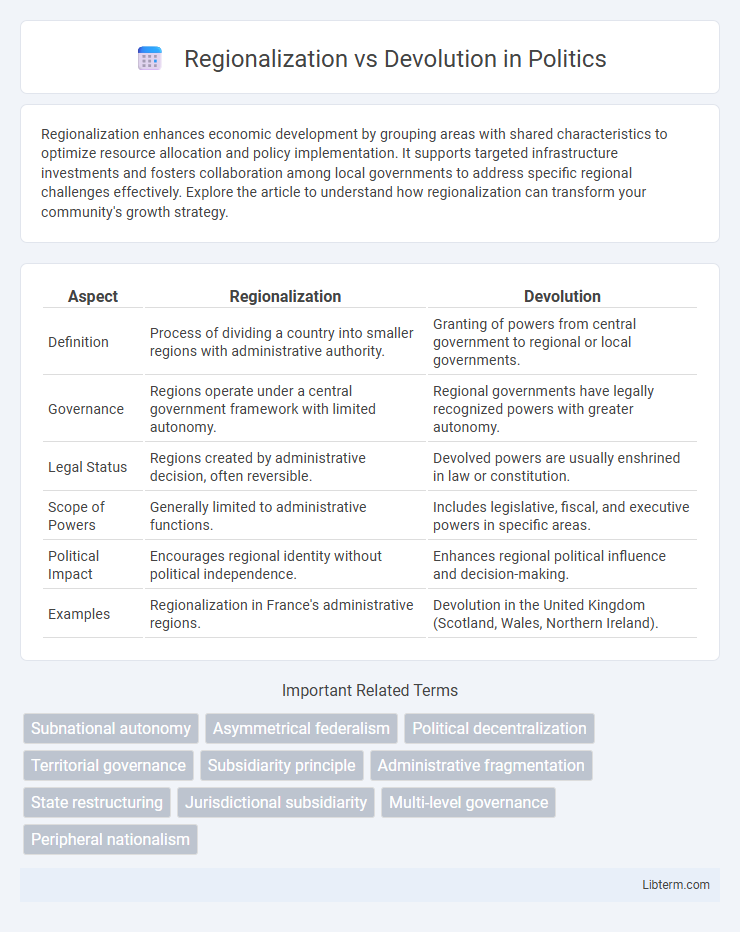Regionalization enhances economic development by grouping areas with shared characteristics to optimize resource allocation and policy implementation. It supports targeted infrastructure investments and fosters collaboration among local governments to address specific regional challenges effectively. Explore the article to understand how regionalization can transform your community's growth strategy.
Table of Comparison
| Aspect | Regionalization | Devolution |
|---|---|---|
| Definition | Process of dividing a country into smaller regions with administrative authority. | Granting of powers from central government to regional or local governments. |
| Governance | Regions operate under a central government framework with limited autonomy. | Regional governments have legally recognized powers with greater autonomy. |
| Legal Status | Regions created by administrative decision, often reversible. | Devolved powers are usually enshrined in law or constitution. |
| Scope of Powers | Generally limited to administrative functions. | Includes legislative, fiscal, and executive powers in specific areas. |
| Political Impact | Encourages regional identity without political independence. | Enhances regional political influence and decision-making. |
| Examples | Regionalization in France's administrative regions. | Devolution in the United Kingdom (Scotland, Wales, Northern Ireland). |
Understanding Regionalization and Devolution
Regionalization involves the administrative division of a country into smaller regions to improve governance and resource management, often without transferring significant decision-making powers. Devolution refers to the formal transfer of political and administrative authority from a central government to subnational units, such as states or provinces, granting them autonomy over certain policy areas. Understanding the distinction highlights how regionalization focuses on administrative efficiency, while devolution emphasizes political empowerment and local self-governance.
Historical Context of Regionalization and Devolution
Regionalization emerged predominantly in the mid-20th century as a response to growing demands for administrative efficiency and economic planning, often driven by post-World War II reconstruction and urbanization trends in Europe and North America. Devolution gained momentum in the late 20th century, notably during the 1970s and 1990s, characterized by the transfer of political powers from central governments to regional or local authorities, exemplified by the UK's establishment of the Scottish Parliament and Welsh Assembly. Both processes reflect historical shifts toward decentralization, yet regionalization primarily emphasizes administrative boundaries, while devolution focuses on political autonomy and legislative competence.
Key Differences Between Regionalization and Devolution
Regionalization refers to the administrative process of dividing a country into smaller regions for efficient governance, while devolution involves the transfer of political power from central to regional authorities, granting them legislative autonomy. Key differences include the extent of authority--regionalization typically maintains centralized control with limited regional input, whereas devolution provides regions with substantial self-governance and decision-making powers. Regionalization aims at improving administrative efficiency, whereas devolution addresses political representation and local empowerment.
Political Motivations Behind Regionalization and Devolution
Regionalization often stems from political motivations to enhance administrative efficiency and promote economic development by decentralizing powers within a framework that maintains central government control. Devolution involves granting substantial legislative and executive autonomy to regional governments, driven by political motivations to accommodate distinct ethnic, cultural, or national identities and reduce separatist pressures. Both processes reflect strategic decisions by central authorities to balance unity with regional aspirations, but devolution typically yields deeper political empowerment compared to regionalization.
Economic Impacts of Regionalization vs Devolution
Regionalization enhances economic efficiency by promoting resource sharing and coordinated infrastructure development across regions, boosting local industries and attracting investments through integrated markets. Devolution allows localized fiscal autonomy, enabling tailored economic policies that reflect regional priorities and improve public service delivery efficiency. While regionalization fosters broader economic cohesion, devolution strengthens regional competitiveness and innovation by empowering local governments with decision-making authority over economic planning and budgeting.
Governance and Autonomy: Comparing Structures
Regionalization involves decentralizing administrative functions within a unitary state to improve efficiency while retaining central government authority, whereas devolution grants legislative powers and political autonomy to regional governments, fostering local self-governance. In governance, regionalization usually maintains standardized policies controlled by the central government, whereas devolution allows for tailored laws and policy-making reflective of regional identities and priorities. Autonomy under devolution is constitutionally protected with distinct regional institutions, contrasting with regionalization's limited administrative discretion and dependence on central approval.
Case Studies: Successes and Failures Worldwide
Regionalization often strengthens economic integration and governance in countries like Spain's Catalonia, fostering autonomy while maintaining national unity, whereas devolution in the United Kingdom, such as Scotland and Wales, showcases varying degrees of political empowerment with ongoing debates about independence. Brazil's regionalization efforts improved infrastructure and social services in the Amazon, contrasted by failed devolution attempts in Nigeria where ethnic tensions exacerbated conflicts and weakened central authority. Case studies reveal that successful regionalization requires clear legal frameworks and local capacity, while devolution depends on balancing regional demands with national cohesion to prevent fragmentation.
Regional Identity and Cultural Implications
Regionalization emphasizes administrative efficiency by granting regions limited powers, often preserving a shared national identity, while devolution transfers substantial political authority to regional governments, strengthening distinct regional identities. Devolution fosters cultural autonomy, enabling regions to promote local languages, traditions, and customs more effectively than regionalization. The cultural implications include enhanced regional pride and potential challenges to national cohesion, as devolved regions assert their unique identity within a broader state framework.
Challenges and Criticisms of Both Models
Regionalization faces challenges such as limited local autonomy and potential inefficiencies due to centralized control, while criticisms include tensions between regional and national identities. Devolution encounters issues like uneven resource distribution and varying degrees of political stability, with criticisms centered on increased fragmentation and administrative complexity. Both models struggle with balancing power distribution, ensuring effective governance, and managing intergovernmental conflicts.
Future Trends: Regionalization vs Devolution
Future trends indicate a growing preference for regionalization as it enhances economic cooperation and governance efficiency across broader territories, particularly in multinational unions like the EU. Devolution continues to empower local governments by granting autonomy over cultural and administrative matters, promoting tailored policy-making and stronger local identity. Emerging hybrid models blend regional integration with devolved powers, balancing centralized coordination and local self-governance to address complex socio-political challenges.
Regionalization Infographic

 libterm.com
libterm.com